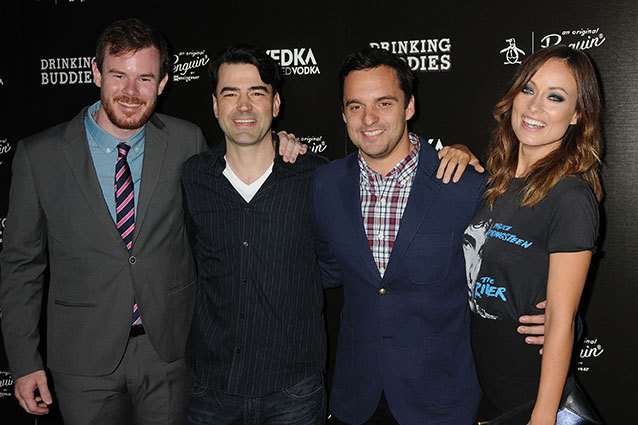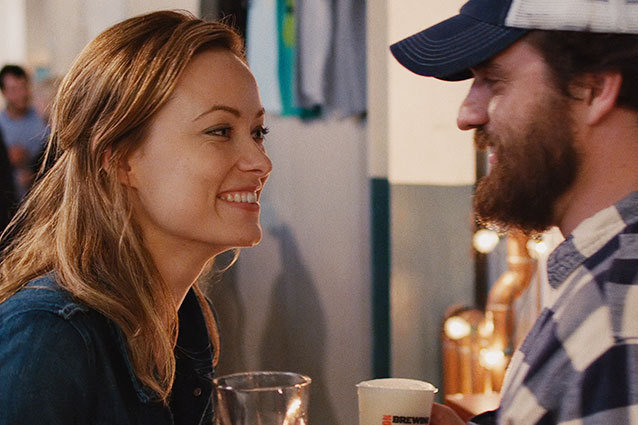 AdMedia/Splash News
AdMedia/Splash News
You’ll see his face (albeit drenched in blood) in this weekend’s horror flick You’re Next, but multihyphenate Joe Swanberg is also responsible for another new feature: Drinking Buddies, the rom-com deconstruction starring Olivia Wilde and Jake Johnson as a pair of coworkers and friends struggling with romantic feelings for one another. A far cry from your typical romantic comedy, the film actually works to turn the genre on its head, injecting honesty and humanity into familiar tropes. Swanberg discusses his new picture, the direction the genre is taking in general, and (perhaps best of all) the psychological intricacies behind helping somebody move.
I’ve seen a ton of romantic comedies throughout the course of my life, and Drinking Buddies felt, to me, like the antithesis of a romantic comedy, in a way. Is that along the lines of what you were going for?
Certainly. I’m a big fan of romantic comedies. It’s a genre that I have historically liked quite a bit, but they’re pretty bad right now. I think we’re at a low point in terms of predictability, and kind of the actors being cast in them. So, I think the plan from the beginning was to use the romantic comedy template and infuse it with characters that seem like real people. And who were going through the small dilemmas that people actually face in their relationships. And then, to still try to make it funny and romantic. But not laugh-out-loud, crazy funny.
You say you’re a fan of the genre. Was there anything historically, maybe from a brighter era in the rom-com timeline, that you particularly wanted to borrow?
Sure. I was riffing definitely on Bob & Carol & Ted & Alice, Paul Mazursky’s movie, and Elaine May’s The Heartbreak Kid. Those were two big shining lights for me with Drinking Buddies. Just in terms of what I felt was, in both cases, an amazing ability to have complex, interesting adult characters that didn’t feel like they were slaves to the plot at all. And then managing to have movies that were also very accessible and big commercial hits at the time. So, this sort of late ’60s, early ’70s romantic comedy was kind of the ideal that I was shooting for. Drinking Buddies isn’t nearly as good as either of those films, but it was at least nice to have those templates to aim for.
The thing that I thought was really interesting about Drinking Buddies, is that you’re not even really rooting for Jake Johnson and Olivia Wilde to get together. I didn’t even think that they might make a good couple. I’m interested in knowing how you make this movie about these two people, who you obviously want to care about, without necessarily even wanting them to reach the goal that they both kind of desire.
I think that this all depends on the audience’s level of familiarity with this story, or with the situation that these characters find themselves in. It’s been interesting to keep track on Twitter of how teenagers are responding to this movie. There, I feel like there is quite a bit of frustration over the fact that these characters don’t get together. And that it doesn’t play by the rules of the kind of movies they’ve been brought up watching. And then, as the audience gets older, there is a lot more relief, almost, that Jake and Anna [Kendrick] work out. So, it’s been a lot of fun seeing how the reaction changes. The older people get, and the more that they’ve had similar experiences in their own lives, they recognize that Jake and Olivia’s characters are not a very good match for each other. They’re both really selfish people. That relationship probably wouldn’t look very good.
You made me think of something interesting when you were talking about teenagers watching the movie. Do you think that there’s something of particular merit in making a movie like this, as opposed to what you see generally in the theater, as opposed to how it shapes the way people look at relationships and romance?
Absolutely. Historically, we learn a lot from movies. They shape the culture in a very big way. At least for me, in my life, before I had any romantic experiences of my own to base things on, everything I knew was from movies. It’s kind of how you first learn about the outside world. So, injecting some reality into the movies is an important task. In lieu of reality, at least some morality. Or a point of view about relationships. I don’t mean to get on a soapbox about it, but you do have to think about these things. At least I do. It would be very miserable for me to put a movie out into the world that I felt was sending a message to young people that was not something I believed in. And I think that is what separates conscientious artistic filmmakers from what we would call hacks, or people who just take a paycheck and show up and crank out whatever gets handed to them.
So, if you could define it, what does Drinking Buddies represent to you that you believe in and find to be very important?
Well, there’s a few things. To me, it provides a model of a couple that encounters a difficulty in their relationship and is able to overcome it. Which is a nice thing to put out there. And, hopefully, it also is a film about the limitations of the fun, flirty, sexy work thing that exists in a very closed circuit. And that thing’s inability to function when you invite the rest of life into it. If these characters only ever saw each other at the brewery, they’d probably be able to maintain that indefinitely. But they also know the parameters of the brewery. They know where that begins and ends. Even if you incorporate their drinking and hanging out after work, it’s codified, and there are a lot of unwritten roles. It’s not until they step outside of that world do they encounter problems. But that’s always the case. You can’t be in a relationship with somebody who you only see at work.
 Magnolia Pictures
Magnolia Pictures
Since you bring it up, why exactly did you choose a brewery?
A couple different reasons. I’m into craft beer. I’m a home brewer. So, it’s a world that I was excited about. And I have friends in Chicago who work in breweries. And it’s also a nontraditional workplace environment. Theoretically, this movie could take place anywhere and it wouldn’t have a major effect on the story. But coming from most of my experiences working in film and on film sets, which is also a nontraditional workplace environment, I did want to introduce the idea that being around beer, and the loose, fun, non officey feeling of the brewery does contribute to this flirtation that they have. In a different way than if they worked in cubicles apart from each other, and they had a dress code, and strict 9 to 5 hours, and things like that.
The decorum would be totally different between them.
Right.
I want to get back to something you were saying about how both characters are pretty self-involved people, and ask about how you can go about delivering characters with flaws like these but still have them come off as lovable.
I just have to trust my gut that if I like them, other people will like them. Also, realistic characters become neither good guys or bad guys. There’s kind of a general area of just “human” that they start to fall into if you can exhibit enough of a range of behavior and emotion. And then the casting is a huge part of it. I always hope that I’m casting the right people that have chemistry with each other, but also are complex enough to exhibit good and bad qualities. Jake Johnson is the kind of person and actor where, I feel like, he could f**k me over 10 times, and I’d still smile when I saw him. He’s just so full of life. He’d be able to talk me into helping him out again. So, you sort of look for that — whatever that quality is — and the rest of the work kind of does its own thing.
And going over to Olivia’s character just for a bit — we’ve seen the archetype for a long time now, in movies and on television, of the hyper competent professional woman whose personal life is kind of in shambles. There are degrees of both of those things in Olivia’s character, but to a much more realistic and less limiting way. She’s still a respectable human being, someone you don’t pity. I was wondering about the process of achieving that after a long line of these failed endeavors at it.
A lot of that is Olivia owning that character. It’s a big part of my process to let the actors have control, and sort of write the characters along with me. There are useful aspects of working from the template, of starting from a place where you recognize these characters from movies. It buys you some time to invite the audience in before you start dissecting that — like, let’s say, what typical romantic comedies do. I feel like all four of these characters, when you first meet them — probably for the first third of the movie — are very recognizable romantic comedy trope characters. The hot, perfect girl at work who does everything right. The prissy, slightly overbearing girlfriend. The older, aloof boyfriend who doesn’t get her. And then the lovable brewery guy. And it’s a way to … let the history of Hollywood do the work for me in terms of how you enter the picture. And now, let’s complicate it. Let’s start messing with these people as clichés and making them a little more human than that. The actors end up doing a lot of that work. It doesn’t feel as much of a writing concern as a performance concern.
And I just want to ask about the scene when Jake is helping Olivia move to another apartment in the movie. What is it about helping someone move that is the most intimate thing you can do?
[Laughs] It’s complicated. Nobody would ever help you move unless they were one of your closet friends. Or a professional mover. You’re on either end of the spectrum: complete stranger or best friend. And, you know, you’re seeing all of somebody’s stuff. You’re getting a look at somebody’s life that’s very different. When you go over somebody’s apartment, they set it up specifically for you. For guests and visitors. They put a public face on it. And then when somebody moves, you’re disassembling that. You’re seeing the guts of who they are and what they own. What they hide. And also, it’s miserable. There are a lot of emotions wrapped up in places. There’s such a big emotional aspect to moving. Leaving a place behind, entering a new place. It’s tough stuff. I hate to do it. I’m sure everyone else hates to do it. So it’s a nice loaded situation.
More:
‘Drinking Buddies’ Review
‘You’re Next’ Review
‘Short Term 12’ Review
Follow @Michael Arbeiter | Follow @Hollywood_com
From Our Partners Battle of the Bikini Bodies (Celebuzz)
Battle of the Bikini Bodies (Celebuzz) Complete Guide to Strippers in Movies and TV (Vh1)
Complete Guide to Strippers in Movies and TV (Vh1)


